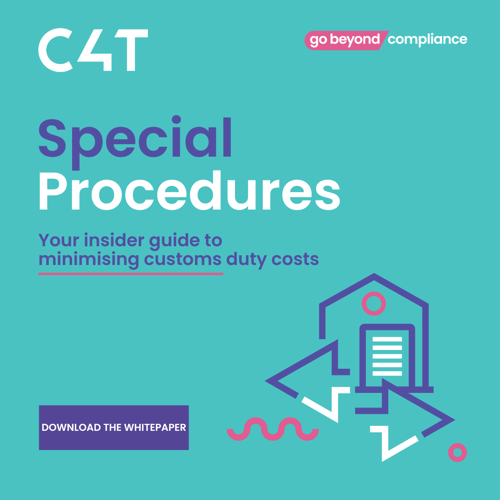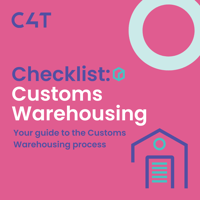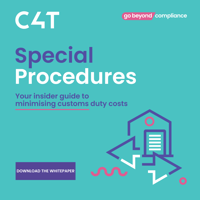Navigate complex Customs Special Procedures with automation
Take advantage of special duty regimes that allow you to store, temporarily use, process, or repair your goods and get either suspension, partial or complete relief from import duty. The use of automated Customs Special Procedures can be beneficial for companies dealing with processing, distribution, and other manufacturing activities that are subject to high duty rates.
How our customs software works
To promote economic activity, many countries offer the possibility of suspending or drawing back customs duties by means of authorisations for the storage and processing of goods. These authorisations are called ‘Special Procedures’ in the Union Customs Code (UCC) and include Inward Processing Relief (IP), Outward Processing Relief (OP), Customs Warehousing (CW), End Use, and Temporary Admission.
Apart from these, Returned Goods Relief (RGR) helps you to avoid paying unnecessary customs duty and VAT on re-imported goods.
While Special Procedures can provide significant cost savings, improve your customs processes, and speed up your supply chain, advanced administration capabilities are required in order for customs authorities to grant authorisations. This includes keeping real-time records of stock balances and providing reporting to customs authorities—tasks that require a software solution to effectively manage. The CAS Special Procedures module in our customs compliance software is a fully compliant digital solution that allows you to implement and manage the most complex inventory-managed customs procedures and produce the required reports and declarations at the touch of a button. Details such as keeping track of free and bonded stocks, stock movements, and stock records per authorisation and storage location are tracked and documented, satisfying the requirements of customs authorities.
"Being able to do our own declarations, alongside managing our customs warehousing in the same system, gives us far greater control. CAS brings everything together in one place, so declarations and warehouse flows run seamlessly, and most of the time it’s zero-touch."
Richard TowensTypes of Special Procedures
Watch this 3-minute video to find out more about different types of customs procedures available in CAS, our customs management system.
Outward Processing
Outward Processing (OP) provides duty relief on goods that are temporarily exported for processing or repair, then re-imported as processed products. Using this Special Procedure, companies do not have to pay duty on the original value of the raw materials; they must only be paid on the value added abroad.
Temporary Admission
Temporary Admission allows goods to be brought into a country temporarily, typically for less than 24 months, with total or partial relief from import duty. This Special Procedure is often used for events like trade shows, art exhibitions, or music festivals.
End Use Relief
End Use Relief reduces or eliminates customs duty on certain imported goods which meet defined criteria and are put to a specific use within a set period of time. This Special Procedure only applies to certain tariff codes, such as goods in the aerospace, shipbuilding, and defence industries.
Cost Savings
Save on customs duty costs or avoid them altogether by taking advantage of Special Procedures such as Inward Processing and Customs Warehousing, resulting in significant economic benefits for companies participating in international trade.
Visibility
Get the reports you need to provide to customs authorities instantly. Gain insights, monitor KPIs, and view status reports via an intuitive dashboard that provides a consolidated, real-time overview across all operations and multiple countries.
Assured Compliance
Rest assured you’re in compliance with changes to customs legislation continually updated in CAS by C4T’s customs experts.
Scalability
Gain organisational agility with the ability to quickly onboard cross-border trade flows, additional storage locations, and production plants, or downscale to focus on the local market.
"Our IP savings will nearly double once we switch to CAS. We’re now capturing benefits that were being missed before. With CAS, we can track everything from stock movements to declarations. That visibility helps us stay compliant and make faster decisions"
Alex RobinsonYour Insider Guide
In order to use Special Procedures, you must obtain an authorisation from customs authorities. This can take up to six months and you will have to demonstrate your ability to comply with special administrative requirements. Download our white paper 'Special Procedures: Your insider guide to minimising customs duty costs' which explains the process in more detail.
Automation
CAS automatically selects stock records, proposes the appropriate customs procedure to discharge the authorisation, and triggers the appropriate declaration.
Reporting
Instantly produce the reports and declarations required by customs authorities at the touch of a button to meet administrative obligations and demonstrate compliance.
Optimisation
CAS automates the selection of free goods, bonded goods, or Union goods based on duty advantages, saving costs, and maximising profits.
Data sharing
Share data, status updates, and other events with business partners and other systems that are integrated with CAS.
Integration
The Special Procedures module integrates directly with your WMS or ERP system via APIs for receiving movements of articles or Bills of Materials (BOMs).
Special Procedures Resources
Frequently asked questions
Want to know more about how Customs Special Procedures work and how CAS supports them? Here are some answers to common questions.
Special Procedures refer to a set of procedures and measures that allow for the temporary or partial suspension of customs duties, taxes, and other fees on goods imported or exported. These procedures are intended to facilitate trade, boost competitiveness, and support economic development.
Yes. The Special Procedures module is linked to the Declarations and Master Data modules, including the corresponding customs authorities. The Special Procedures module covers all legal and administrative requirements for Customs Warehousing, Inward Processing, Outward Processing, End Use, Returned Goods Relief (RGR), and Temporary Admission.
The Special Procedures module has extensive recordkeeping, reporting, and duty optimisation capabilities. Stock records for Special Procedures are based on a combination of movements derived from your customs declarations and from movements directly received from your ERP or WMS source system. Additionally, for processed products, the required composition of materials can be ingested in CAS with different types of messages, typically based on Bill of Materials or Production Orders.
Outward Processing is a Special Customs Procedure that allows companies to export goods outside the customs territory. This can be for processing or repair purposes, and then re-importing them without paying customs duties or taxes on the value added during the processing or repair phase. This procedure helps companies to reduce production costs, increase competitiveness, and access new markets.
IP/OP administration in the CAS solution is accounting-based (record keeping). Stock records for Special Procedures are based on movements derived from customs declarations and received from the ERP or WMS source system. These stock records, housed in CAS, are the basis for reporting to customs authorities.
Yes, an authorisation is mandatory if you want to operate a customs warehouse.
Save up to 80% on customs administration
Drive down costs, manage local, regional, and worldwide customs and speed up turnaround times for UK and European importers and exporters. All within one single platform.






